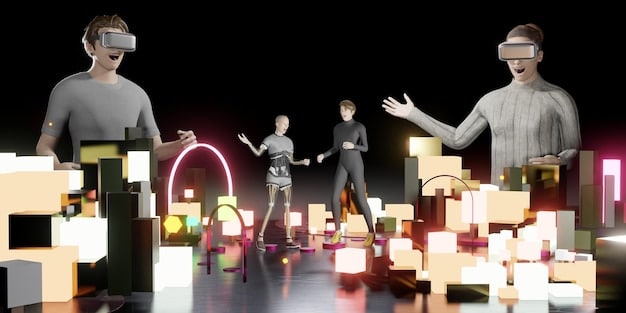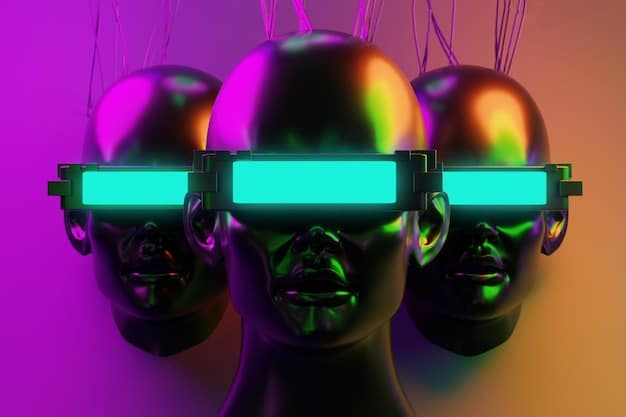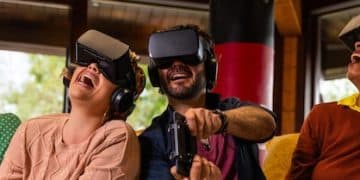US Metaverse Startups: Immersive Experiences in Entertainment & Commerce

The metaverse is rapidly evolving, with US startups leading the charge in developing groundbreaking immersive experiences that redefine entertainment and revolutionize commerce through innovative digital platforms and captivating virtual environments.
The concept of the metaverse has transcended its sci-fi origins, transforming into a tangible frontier where innovation flourishes. This Startup Spotlight: The Metaverse – US Startups Building Immersive Experiences for Entertainment and Commerce explores the pioneering companies from the United States that are not just envisioning but actively constructing the next generation of digital interaction. As these startups push the boundaries of what is possible, they are laying the groundwork for a future where virtual and physical realities intertwine seamlessly, offering unparalleled opportunities for connection, creativity, and economic growth.
the metaverse explained: beyond hype to reality
The metaverse, often misunderstood as a singular virtual world, is in fact a complex, interconnected network of persistent, real-time 3D virtual environments that allow for synchronous interaction among users and digital objects. It’s an evolution of the internet, moving from a flat, two-dimensional experience to an immersive, three-dimensional one. This paradigm shift holds significant implications for how we work, play, socialize, and conduct business, promising an unprecedented level of engagement and presence.
Understanding the metaverse requires looking beyond the superficial buzzwords and recognizing the underlying technologies and philosophical shifts it represents. It’s not just about VR headsets; it’s about the convergence of blockchain, artificial intelligence, augmented reality, and virtual reality, creating a digital ecosystem where digital ownership, identity, and economies thrive. US startups are at the forefront of this convergence, developing the foundational infrastructure and compelling applications that are bringing this vision to life.
core components of the metaverse landscape
To truly grasp the metaverse, it’s essential to dissect its primary components that these pioneering startups are actively building upon:
- Presence and Immersion: The feeling of ‘being there,’ achieved through VR, AR, and mixed reality technologies, creating believable virtual environments.
- Interoperability: The ability for digital assets, avatars, and experiences to seamlessly move between different metaverse platforms, fostering a truly interconnected digital universe.
- Decentralization: Often powered by blockchain technology, enabling user ownership of digital assets (NFTs) and governance, moving away from centralized control.
- Economic Layer: A complete digital economy built on cryptocurrencies and NFTs, allowing users to create, buy, sell, and trade digital goods and services.
These elements combine to form a dynamic and evolving space where users can engage in a vast array of activities, from virtual concerts and gaming to digital fashion and e-commerce. The opportunities for innovation are immense, attracting significant investment and talent, particularly within the vibrant startup ecosystem of the United States. The race to define and dominate aspects of the metaverse is on, driven by companies pushing technological boundaries.
The metaverse represents a profound shift in how we conceive of digital interaction, moving towards a more embodied and persistent online existence. US startups are not merely participants in this transformation but are actively shaping its contours, demonstrating ingenuity and foresight in their approaches. Their work spans infrastructure development, content creation, and economic frameworks, each piece critical to the metaverse’s eventual widespread adoption and functional utility in daily life.

entertainment unlocked: immersive gaming and experiences
The entertainment industry is arguably the most recognizable entry point into the metaverse for many, with gaming leading the charge. US startups are innovating fiercely in this space, moving beyond traditional gaming to create truly immersive and interactive experiences that blur the lines between reality and simulation. These companies are developing platforms where players aren’t just consumers but active participants and creators, shaping the digital narratives they engage with.
From hyper-realistic virtual worlds where players can socialize, compete, and build, to platforms that host massive virtual concerts and interactive events, the scope of entertainment in the metaverse is exploding. Startups are leveraging advanced graphics, haptic feedback, and AI-driven characters to enhance immersion, making digital experiences feel more tangible and emotionally resonant. This continuous evolution promises a future where entertainment is less about passive consumption and more about active, shared creation.
pioneering entertainment platforms
Several US-based startups are making significant strides in defining metaverse entertainment:
- Epic Games (Fortnite): While not a traditional “startup” anymore, Epic Games continuously pushes the boundaries of gaming as a social platform, hosting groundbreaking virtual concerts and brand activations that exemplify metaverse principles. Their Unreal Engine is also a foundational tool for many other metaverse developers.
- Roblox: A platform empowering millions of creators to build their own immersive experiences and games, fostering a massive user-generated content ecosystem that embodies the democratized nature of metaverse creation.
- Decentraland & The Sandbox (US-based teams/communities): Though built on decentralized principles with global communities, significant US-based development and community engagement drives these virtual worlds, where users own land, build experiences, and host events, from art galleries to concerts.
These platforms demonstrate a pivot towards user-centric design, where the audience becomes participants in content creation rather than just passive consumers. This shift cultivates deeper engagement and fosters vibrant digital communities centered around shared experiences and creative expression. The economic models supporting these ventures often involve digital currencies and NFT-based ownership, giving users tangible stakes in the virtual worlds they inhabit.
Beyond gaming, the metaverse is transforming live events. Virtual concerts now draw millions of attendees, offering experiences that transcend physical limitations, allowing artists to connect with global audiences in innovative ways. Similarly, virtual reality arcades and interactive narrative experiences are emerging, providing new avenues for storytelling and communal entertainment. US startups are at the forefront of this experiential revolution, investing heavily in the infrastructure and creative talent needed to deliver these next-gen attractions.
commerce reimagined: digital economies and marketplaces
The metaverse is not just a playground; it’s rapidly evolving into a robust economic engine, creating entirely new paradigms for commerce. US startups are at the vanguard of this transformation, building the infrastructure and platforms that facilitate digital transactions, foster ownership of virtual assets, and enable businesses to thrive in immersive environments. This new frontier of commerce extends far beyond simple online shopping, encompassing digital real estate, fashion, art, and even virtual services.
The core of metaverse commerce often relies on blockchain technology, enabling transparent and secure ownership of unique digital items, known as Non-Fungible Tokens (NFTs). These NFTs represent anything from virtual land and avatar wearables to exclusive access passes and digital artwork. This verifiable ownership creates scarcity and value within the digital realm, laying the foundation for thriving virtual economies where users can create, buy, sell, and trade. US innovators are exploring countless business models within this burgeoning space, from virtual storefronts to entirely new types of digital agencies.
disruptive commercial ventures
Key areas where US startups are making significant commercial impact in the metaverse include:
- Digital Fashion and Wearables: Companies are designing, marketing, and selling virtual clothing and accessories for avatars, allowing users to express their identity in the metaverse. Some even combine digital and physical twins.
- Virtual Real Estate and Land Sales: Platforms where users can buy, sell, and develop digital land parcels, creating spaces for events, businesses, or personal expression, similar to real-world property markets.
- NFT Marketplaces and Infrastructure: Developing secure and user-friendly platforms for trading NFTs, as well as the underlying blockchain technology and smart contracts that enable these transactions.
- Brand Experiences and Marketing: Helping established brands enter the metaverse by creating immersive advertising campaigns, virtual pop-up shops, and unique brand activations that engage consumers in novel ways.
These ventures signify a monumental shift from traditional e-commerce, offering businesses and consumers unprecedented opportunities for interaction and value creation in a fully immersive digital space. The ability to own unique digital assets transforms the online economy from rental-based models to genuine ownership, empowering users and fostering new forms of entrepreneurialism. US startups recognize the vast potential here, attracting significant investment from venture capitalists keen to capitalize on the next wave of digital innovation.
The integration of payment systems, secure digital wallets, and blockchain-based smart contracts is crucial for the seamless functioning of these metaverse economies. US tech companies are developing the sophisticated back-end infrastructure to support high-volume transactions and ensure trust and transparency in digital asset ownership. This robust framework is essential for scaling metaverse commerce and integrating it further into mainstream consumer behavior, blurring the lines between online and offline spending patterns.
key technologies powering the metaverse revolution
The realization of the metaverse vision hinges on a convergence of cutting-edge technologies, each contributing a vital piece to the immersive puzzle. US startups are investing heavily in these foundational technologies, developing the hardware, software, and protocols that make scalable, interactive, and truly immersive metaverse experiences possible. Without these underlying innovations, the metaverse would remain a distant dream, limited by computational power, network latency, and graphical fidelity.
Virtual Reality (VR) and Augmented Reality (AR) headsets are the most visible interfaces, providing the immersive lenses through which users experience the metaverse. However, their full potential can only be unlocked with advancements in other areas, such as high-fidelity 3D rendering, real-time physics engines, and advanced spatial audio. The seamless integration of these technologies is a continuous challenge, one that many US companies are tackling with innovative solutions.
essential technological pillars
The primary technologies enabling the metaverse today include:
- Virtual Reality (VR) and Augmented Reality (AR): Providing the immersive visuals and interactive capabilities, from standalone headsets to AR glasses that overlay digital content onto the physical world.
- Blockchain and NFTs: Underpinning digital ownership, identity, and decentralized economies, ensuring transparency and security for virtual assets and transactions.
- Artificial Intelligence (AI): Powering realistic NPC behaviors, optimizing content generation, personalizing user experiences, and enabling advanced conversational AI within virtual environments.
- 5G and Edge Computing: Delivering the low latency and high bandwidth necessary for real-time, synchronous interactions across vast virtual worlds, pushing computation closer to the user.
- 3D Modeling and Rendering: Tools and software for creating detailed and realistic virtual environments, objects, and avatars, pushing the boundaries of visual fidelity.
US companies like Meta (formerly Facebook), through their Oculus/Quest line, are leading hardware development for VR, making immersive experiences more accessible to the consumer market. Alongside hardware, a proliferation of software development kits and content creation tools are emerging, democratizing access to metaverse creation for a broader range of developers and artists.
The rapid advancement of these technologies is creating a virtuous cycle: as hardware becomes more powerful and affordable, more developers are incentivized to create rich metaverse content, which in turn drives further hardware sales and technological innovation. This iterative process is accelerating the metaverse’s evolution from niche concept to mainstream phenomenon, with US startups often serving as the catalysts for these transformative leaps.
challenges and opportunities for metaverse startups
While the metaverse presents an ocean of opportunity, navigating its nascent waters comes with significant challenges for US startups. These hurdles range from technological limitations and standardization issues to user adoption complexities and regulatory uncertainties. Overcoming these obstacles is critical for the long-term viability and widespread success of metaverse ventures, requiring ingenuity, resilience, and a collaborative spirit among innovators.
One of the primary challenges is achieving true interoperability—the ability for digital assets, avatars, and experiences to seamlessly move between different metaverse platforms. Without standardization, the metaverse risks fragmenting into isolated digital islands, hindering its potential for universal connectivity and value creation. Startups are exploring various open protocols and decentralized solutions to address this, but it remains a complex technical and ideological challenge.
navigating the metaverse landscape
Key challenges and corresponding opportunities include:
- Technical Scalability: Building platforms capable of supporting millions of concurrent users in high-fidelity, real-time environments. Opportunity: Breakthroughs in cloud computing, edge computing, and rendering technologies.
- User Adoption & Accessibility: Overcoming the high cost of hardware, steep learning curves, and the need for compelling use cases beyond novelty. Opportunity: Developing intuitive interfaces, lower-cost devices, and killer applications that resonate with mainstream audiences.
- Interoperability & Standardization: Ensuring seamless transitions and asset ownership across disparate virtual worlds. Opportunity: Contributing to open standards and developing cross-platform solutions that enhance user freedom and experience.
- Security, Privacy & Ethics: Addressing concerns around data privacy, digital identity, content moderation, and potential for harassment in immersive spaces. Opportunity: Implementing robust security measures, privacy-by-design principles, and responsible governance frameworks.
- Monetization Models: Developing sustainable and equitable economic models that benefit creators, users, and platforms. Opportunity: Innovating with NFT-based economies, play-to-earn models, and decentralized autonomous organizations (DAOs).
Despite these challenges, the opportunities for innovation and market leadership are immense. Startups that can effectively address these pain points while delivering compelling user experiences are poised to capture significant market share. The metaverse is still in its early innings, leaving ample room for disruption and the emergence of entirely new industries and job roles.
Moreover, the regulatory landscape is still largely undefined, presenting both uncertainty and flexibility for metaverse innovators. US startups are actively engaging with policymakers to help shape regulations that foster innovation while protecting users. The companies that demonstrate foresight in building secure, ethical, and user-centric metaverse experiences will be the ones that ultimately thrive and build enduring platforms, setting the benchmarks for future digital evolution.
the future of immersive experiences: what’s next?
The metaverse, as conceived and built by US startups today, is merely a precursor to its full potential. The trajectory of immersive experiences suggests a future where digital realities become indistinguishable from, and deeply integrated with, our physical lives, opening up unprecedented avenues for human interaction, creativity, and economic activity. Predicting the exact shape of this future is challenging, but several trends point towards a profound transformation.
We can anticipate a move towards even greater realism and sensory fidelity, with advancements in haptics, olfaction, and even taste integration that will make virtual experiences more visceral. The proliferation of lighter, more discreet AR glasses will seamlessly blend digital information with our physical surroundings, making the augmented layer of the metaverse a constant companion rather than an accessed destination. This always-on, always-present digital overlay will redefine how we perceive and interact with our world.
emerging trends shaping the metaverse
Key areas poised for future growth and innovation include:
- Hyper-Personalization: AI-driven avatars and environments will adapt in real-time to user preferences, moods, and biometric data, creating truly unique and responsive experiences.
- Human-Computer Interfaces: Beyond controllers and gestures, direct brain-computer interfaces (BCIs) could offer seamless, thought-driven interaction, reducing friction and enhancing immersion.
- Digital Twin Ecosystems: The creation of precise digital replicas of physical objects, places, and even individuals, enabling new forms of simulation, remote operation, and real-world utility within virtual spaces.
- Sustainable Metaverse Development: Growing focus on energy-efficient blockchain solutions and sustainable practices to mitigate the environmental impact of large-scale virtual worlds.
- Education and Training: Immersive simulations will revolutionize learning, offering hands-on experiences for complex subjects, professional training, and skill development that are impossible or impractical in the physical world.
The boundary between consuming content and creating it will continue to dissolve, with accessible tools empowering anyone to design, build, and monetize their own metaverse experiences. This democratization of creation will fuel an explosion of diverse content, driving innovation from the grassroots up. The economic opportunities will expand beyond digital goods to encompass new forms of digital labor, virtual tourism, and hyper-personalized services.
Ultimately, the future of immersive experiences, shaped by the relentless innovation of US startups, points towards a metaverse that is not just a destination but a fundamental layer of our existence. It will be a dynamic, evolving canvas where creativity knows no bounds, where communities flourish across geographical divides, and where the lines between the physical and digital continue to blur, ushering in an era of unprecedented interconnectedness and possibility.
| Key Point | Brief Description |
|---|---|
| 🎮 Immersive Entertainment | US startups are redefining entertainment through VR/AR gaming, virtual concerts, and interactive experiences, fostering user-driven content. |
| 🛍️ Digital Commerce | New economic models are emerging via NFTs, virtual real estate, and digital fashion, enabling robust metaverse economies. |
| ⚙️ Core Technologies | Advancements in VR/AR, blockchain, AI, 5G, and 3D rendering are foundational to building and scaling immersive metaverse experiences. |
| 🚧 Challenges & Future | Navigating issues like interoperability and adoption while charting a future towards hyper-personalized and pervasive digital realities. |
frequently asked questions
▼
The metaverse is a persistent, interconnected network of 3D virtual environments where users can interact synchronously. US startups are pivotal in its development by building foundational technologies like VR/AR hardware, blockchain infrastructures for digital ownership, and AI for immersive content creation, driving both entertainment and commerce within these digital spaces. Their innovations span gaming, virtual real estate, and digital fashion, shaping the future of online interaction.
▼
US startups are transforming entertainment by creating highly interactive and immersive experiences. This includes developing advanced VR/AR games that allow players to create and monetize content, hosting large-scale virtual concerts, and building social platforms where users can engage in shared digital experiences. Companies like Epic Games and Roblox are at the forefront, turning passive consumption into active, collaborative participation, enabling new forms of digital artistry and community.
▼
NFTs (Non-Fungible Tokens) are crucial for establishing digital ownership and enabling new forms of commerce in the metaverse. For US companies, NFTs facilitate the secure buying, selling, and trading of unique digital assets such as virtual land, avatar wearables, and exclusive digital art. This verifiable ownership creates scarcity and value, enabling robust virtual economies and empowering creators and businesses to monetize their digital goods and services effectively within immersive environments.
▼
Metaverse startups in the US face significant technological hurdles, including achieving seamless interoperability between different platforms, ensuring high scalability to support millions of concurrent users, and addressing user adoption through more affordable and accessible hardware. Other challenges involve securing digital assets, maintaining user privacy, and developing robust AI for realistic interactions. Overcoming these requires continuous innovation in areas like 5G, edge computing, and advanced rendering.
▼
Beyond entertainment and commerce, the metaverse is poised to revolutionize sectors like education, healthcare, and professional training. Immersive simulations will offer hands-on learning experiences and remote medical consultations. Digital twin technologies will enhance industrial design and maintenance. The metaverse could also redefine how we socialize, fostering global communities and new forms of digital governance, ultimately creating a more interconnected and experientially rich digital layer across various aspects of daily life.
conclusion
The metaverse, propelled by the relentless innovation of US startups, is rapidly transforming from a speculative concept into a tangible reality, reshaping how we interact with digital content and each other. These pioneering companies are not just building virtual worlds; they are constructing the foundational infrastructure, compelling applications, and economic frameworks that will underpin the next evolution of the internet. By pushing the boundaries of immersive experiences in entertainment and revolutionizing commerce through unprecedented digital economies, US startups are at the forefront of defining a future where our digital and physical lives are increasingly intertwined, promising a new era of connectivity, creativity, and boundless opportunity.





